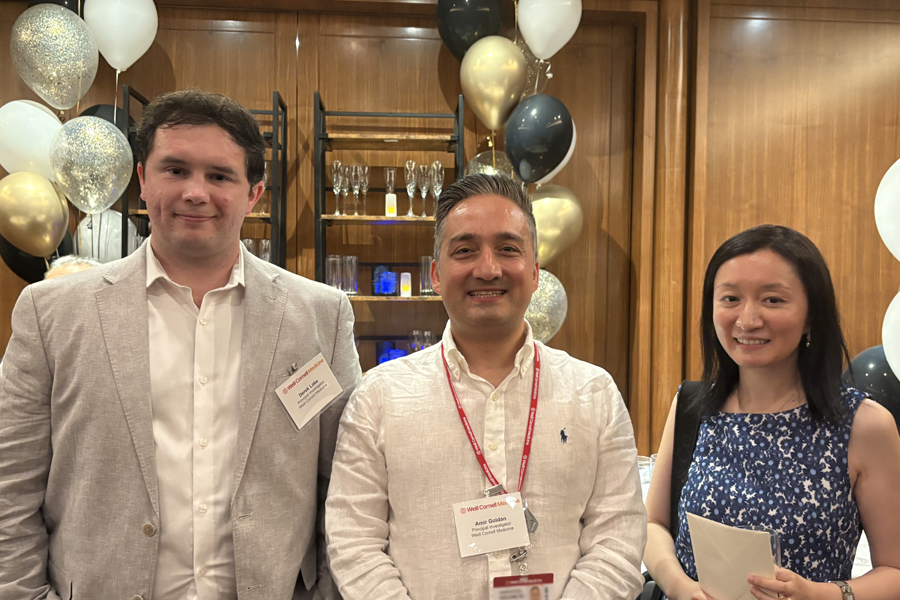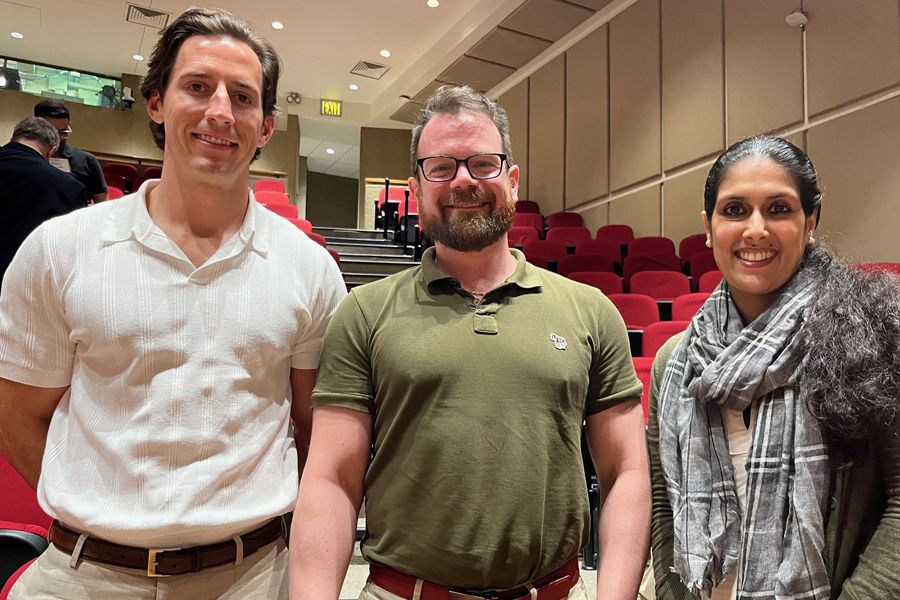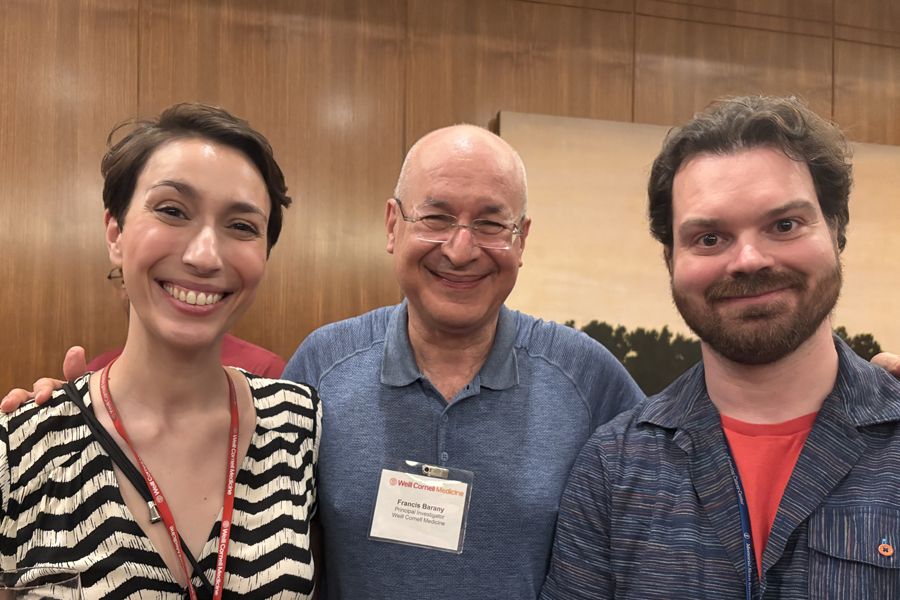
BioVenture eLab’s Biomedical Innovation Challenge celebrated its seventh cohort on June 24 with a final pitch event and scientific presentations in Uris Auditorium. The Biomedical Innovation Challenge, formerly known as the Biomedical Business Plan Challenge, is part of a suite of innovation-focused programs offered to enrich the Weill Cornell Medicine scientific community. It guides Weill Cornell scientists and clinicians in developing their ideas from innovations into commercial products, providing mentorship, training and exposure to industry resources.
Participants explore the commercialization process through expert-led lectures and mentorship focusing on intellectual property, market research, R&D planning and regulatory pathways. Throughout the program, teams develop their go-to-market strategy and financial needs, culminating in a pitch presentation to a panel of venture capital and industry judges.
Over the years, the Biomedical Innovation Challenge has led to the formation of several startups, with many alumni securing government grants, angel funding and venture capital based on foundational intellectual property from Weill Cornell Medicine. BioVenture eLab continues to support these ventures by connecting them with investors, industry business development executives, professional management teams and commercialization resources.
“Weill Cornell scientists and clinicians are fully capable of bringing innovations to market; however, the path is long and risky,” said Dr. Lisa Placanica, senior managing director of the Center for Technology Licensing at Weill Cornell Medicine. “Enterprise Innovation provides access to the tools and support that help them navigate the journey—from IP strategy to market launch.”
Leveraging AI to Improve Population Health
This year’s competitors all pitched artificial intelligence-enabled solutions aimed at improving early disease detection and enhancing health outcomes at scale. The judging panel included Dr. Max Colbert, associate at Medical Excellence Capital; Dr. Kyle Kaniecki, vice president of life sciences and healthcare at NYC Economic Development Corporation; and Nishta Rao, head of life sciences and healthcare at Citizens Private Bank. Judges questioned the competitors on clinical integration, market adoption, reimbursement strategy and potential partnerships.

Panel of Judges. From Left to Right: Dr. Max Colbert, Dr. Kyle Kaniecki and Nishta Rao.
First place went to Dr. Amir Goldan, who was recruited to Weill Cornell Medicine as an associate professor of electrical engineering in radiology and is co-founder of Neurotwain, which aims to improve early detection of Alzheimer’s disease through a novel, non-invasive diagnostic platform. Alzheimer’s affects nearly 7 million Americans, with projected health care costs reaching $1 trillion by 2050. Yet, current diagnostics like PET brain imaging are costly and can detect only a small fraction of early-stage cases.
Neurotwain uses augmented reality and audio-visual stimulation to activate brain regions, tracking responses via eye movement to generate a functional map of brain activity. This biomarker data, combined with AI, allows for the creation of a personalized “neuro twin” to potentially predict disease progression and treatment response. A feasibility study is currently underway to demonstrate clinical utility in detecting preclinical Alzheimer’s. Neurotwain is now expanding its dataset in collaboration with clinical partners, and its platform could eventually apply to other neurodegenerative diseases.
“The Biomedical Innovation Challenge course not only taught me the necessary knowledge to navigate the business and market side of things, but also helped me articulate my innovation and craft my story to resonate with investors,” Dr. Goldan said. “The pitch competition was extremely valuable, especially for an early-stage academic entrepreneur like me, because it provided a platform for me to test my innovation by pitching it to a live audience, gauge the market appeal of our idea, gain exposure and get feedback from experienced professionals and investors.”
CarePredict, co-founded by Dr. Rainu Kaushal, senior associate dean for clinical research and chair of the Department of Population Health Sciences, and Dr. Derek Lake (M.Sc. ’16), an instructor in population health sciences and expert in value-based care, earned second place in the competition. CarePredict targets the estimated $300 billion in waste from preventable and low-value care in the U.S. health care system. Its platform integrates an ensemble of AI models with the intention of predicting adverse events and associated costs based on clinical data, potentially enabling earlier interventions by care teams. A pilot program will launch in September, and the company has been invited to pitch to two health care organizations.
Third place went to Lilia, led by Dr. Yiye Zhang, associate professor of population health sciences. Lilia aims to combat online health misinformation through an AI-enabled app that delivers personalized, evidence-based health content and peer support. Drawing on electronic health record and user-generated data, Lilia’s current focus is on maternal mental health. The team envisions the app’s future use in remote monitoring and broader mental health care delivery.
Expanding the Frontier of Therapeutic Discovery
In addition to the competition, two non-competing teams presented platform technologies designed to transform the development of cancer therapeutics.

From Left to Right: Dr. Elena Valdambrini, Dr. Francis Barany and Dr. Matthew Deyell.
Dr. Matthew Deyell, a postdoctoral associate in computational biomedicine, presented on behalf of Manarola, a notional startup he co-founded with Dr. Ashley Laughney, associate professor of physiology and biophysics. Manarola’s synthetic biology platform creates high-resolution 3D functional maps of cancer-targeted proteins. It is designed to enable comprehensive mutation screening, lead compound optimization, response prediction and AI model training for drug design. The platform is currently being used in partnership with another Weill Cornell startup, ARMA Bio, Inc., to advance a novel therapy for prostate cancer.
Dr. Elena Valdambrini, a postdoctoral associate in microbiology and immunology, provided an update on Chiara Biosciences (formerly TwiXimo Therapeutics), a 2024 Challenge runner-up co-founded by Dr. Francis Barany, professor of microbiology and immunology. The company has developed a high-throughput screening platform built on a comprehensive library of target proteins and monomers. It is developing small-molecule protein degraders for the treatment of cancer. Over the past year, Chiara has raised $3.5 million in funding, added key team members, and is actively exploring additional oncology targets.
“We routinely interact with faculty and trainees throughout the year to encourage the pursuit of new ideas and approaches to improve patients’ lives. We invite all members of the community to explore the potential of their ideas,” emphasized Loren Busby, director of BioVenture eLab.

